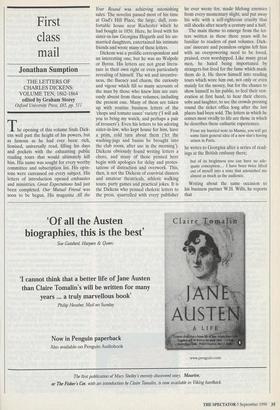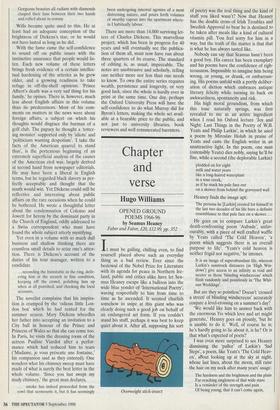First class mail
Jonathan Sumption
THE LETTERS OF CHARLES DICKENS: VOLUME TEN, 1862-1864 edited by Graham Storey Oxford University Press, £65, pp. 511 The opening of this volume finds Dick- ens well past the height of his powers, but as famous as he had ever been: rich, lionised, universally read, filling his days and pockets with the exhausting public reading tours that would ultimately kill him. His name was sought for every worthy committee and subscription list. His opin- ions were canvassed on every subject. His letters of introduction opened embassies and ministries. Great Expectations had just been completed. Our Mutual Friend was soon to be begun. His magazine All the Year Round was achieving astonishing sales. The novelist passed most of his time at Gad's Hill Place, the large, dull, com- fortable house near Rochester which he had bought in 1856. Here, he lived with his sister-in-law Georgina Hogarth and his un- married daughters, entertained his intimate friends and wrote many of these letters.
Dickens was a prolific correspondent and an interesting one, but he was no Walpole or Byron. His letters are not great litera- ture in their own right or even particularly revealing of himself. The wit and inventive- ness, the fluency and charm, the curiosity and vigour which fill so many accounts of the man by those who knew him are curi- ously absent from these volumes, including the present one. Many of them are taken up with routine business letters of the `chops and tomato sauce' variety CI will ask you to bring my watch, and perhaps a pair of trousers'). Even his letters to his adoring sister-in-law, who kept house for him, have a prim, cold turn about them (get the washing-jugs and basins be brought into the club room, after use in the morning'). Dickens obviously found writing letters a chore, and many of those printed here begin with apologies for delay and protes- tations of distraction and overwork. This, then, is not the Dickens of convivial dinners and amateur theatricals, athletic walking tours, party games and practical jokes. It is the Dickens who penned choleric letters to the press, quarrelled with every publisher he ever wrote for, made lifelong enemies from every momentary slight, and put away his wife with a self-righteous cruelty that still shocks after nearly a century and a half.
The main theme to emerge from the let- ters written in these three years will be familiar to readers of past volumes. Dick- ens' insecure and penniless origins left him with an overpowering need to be loved, praised, even worshipped. Like many great men, he hated being importuned by strangers but lived for the fame which made them do it. He threw himself into reading tours which wore him out, not only or even mainly for the money, but for the chance to show himself to his public, to feel their ven- eration at first hand, to hear their cheers, sobs and laughter, to see the crowds pressing round the ticket office long after the last places had been sold. The letters in which he comes most vividly to life are those in which he describes these cathartic experiences.
From my hurried note to Mamie, you will get some faint general idea of a new star's having arisen in Paris,
he writes to Georgina after a series of read- ings at the British embassy there; but of its brightness you can have no ade- quate conception... I have been twice lifted out of myself into a state that astonished me almost as much as the audience.
Writing about the same occasion to his business partner W.H. Wills, he reports that
Gorgeous beauties all radiant with diamonds clasped their fans between their two hands and rolled about in ecstasy.
Wills became quite used to this. He at least had an adequate conception of the brightness of Dickens's star, or he would not have lasted as long as he did.
With the fame came the self-confidence to sound off on public issues with the instinctive assurance that people would lis- ten. Each new volume of these letters brings fresh evidence of a certain intellec- tual hardening of the arteries as he grew older, and a growing readiness to take refuge in off-the-shelf opinions. 'Prince Albert's death was a very sad thing for his family,' he opines. There is, however, much less about English affairs in this volume than its predecessors. Most of his com- ments on matters in the news were about foreign affairs, a subject on which his thoughts would disgrace the barman of a golf club. The papacy he thought a 'totter- ing monster' supported only by 'idiots' and `politicians wanting despotism'. 'I take the facts of the American quarrel to stand thus', is the portentous beginning of an extremely superficial analysis of the causes of the American civil war, largely derived at second hand from newspaper editorials. He may have been a liberal in English terms, but he regarded black slavery as per- fectly acceptable and thought that the south would win. Yet Dickens could still be reflective and interesting about public affairs on the rare occasions when he could be bothered. He wrote a thoughtful letter about the condemnation of Colenso and Jowett for heresy by the dominant party in the Church of England, oddly addressed to a Swiss correspondent who must have found the whole subject utterly mystifying.
Yet even in a volume with so much dull business and shallow thinking there are countless small details to seize one's atten- tion. There is Dickens's account of the duties of his tour manager, written to a candidate
... seconding the Inimitable in the ring, deliv- ering him at the scratch in fine condition, keeping off the crowd, polishing him up when at all punished, and checking the local accounts.
The novelist complains that his inspira- tion is cramped by the 'odious little Lon- don box' which he had rented for the summer season. Mary Dickens wheedles her father into accepting an invitation to a City ball in honour of the Prince and Princess of Wales so that she can come too. In Paris, he visits the dressing room of the actress Pauline Viardot after a perfor- mance which had reduced him to tears (`Madame, je vous presente une fontaine,' his companion said as they entered). One wonders what his chimney sweep must have made of what is surely the best letter in the whole volume. 'Since you last swept my study chimney,' the great man declares,
. . . smoke has indeed proceeded from the cowl that surmounts it, but it has seemingly
been undergoing internal agonies of a most distressing nature, and pours forth volumes of swarthy vapour into the apartment where- in I habitually labour.
There are more than 14,000 surviving let- ters of Charles Dickens. This marvellous project, which has been in progress for 40 years and will eventually see the publica- tion of them all, must now have run about three quarters of its course. The standard of editing is, as usual, impeccable. The notes are unobtrusive and scholarly, telling one neither more nor less than one needs to know. To own the entire series requires wealth, persistence and longevity, or very good luck, since the whole is hardly ever in print at the same time. One day, perhaps the Oxford University Press will have the self-confidence to do what Murray did for Byron's letters, making the whole set avail- able at a bearable price to the public, and not just to university libraries, book reviewers and well remunerated barristers.



























































 Previous page
Previous page